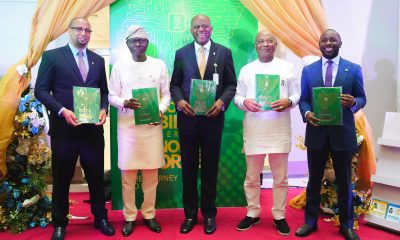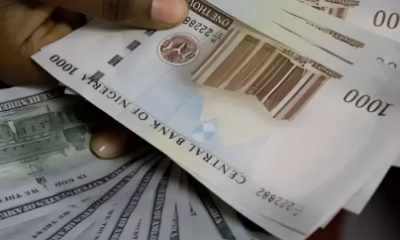Business
Carrots, sticks, not enough to save the naira
Published
10 years agoon
By
Olu Emmanuel
• Nigerians brace up for further fall of currency
By ODUNEWU SEGUN
FINANCIAL experts have argued that the carrot and stick approach by the Central Bank of Nigeria to ameliorate the rising exchange rate fluctuations has failed to address the value of the naira, which in recent times has come under serious bashing.
They asserted that with the naira already exchanging for over N400 to a dollar at the parallel market, coupled with falling foreign reserves, the CBN must adjust the exchange rates in other to avert a more serious economy crisis.
The Managing Director and Chief Executive Officer, Economic Associates, Dr. Ayo Teriba, said the restrictions the CBN had put in place in the wake of the shortage of foreign exchange had been counter-productive. “My big issue with the way the central bank has chosen to manage the naira is that the it speaks about the reserves and exchange rate situation as if it is only about trading, and I think they get it wrong in that regard. It is not all about trading; capital flows matter.”
ALSO SEE: Forex scarcity: Stanbic IBTC, Ecobank, others cut customers’ foreign spending
Teriba said the restrictive policies had scared capital away from Nigeria and eroded confidence of wealth holders in holding naira-denominated assets. “By the time you start telling people that they cannot use their debit cards abroad, do you think that is going to encourage them to hold more money in naira? It is going to scare them to even flee the naira the more.”
A Lagos based Economist and financial expert, Henry Boyo, said if the apex bank continues with the present situation, the naira might dip towards N600 to a dollar before the end of 2016. He said, “CBN cannot continue to use attacking syndrome to fight pressure on Naira. What the apex bank needs to do is to create an enabling environment that will give the Naira its value.”
The steady depreciation, National Daily learnt was aggravated by the inability of the CBN to meet foreign exchange demand coupled with a sharp decline in the prices of crude. It was gathered that the parallel market is being bedeviled with demand for foreign exchange from importers of the 41 items excluded from the official market by CBN last year as well as importers of items not excluded from the official market.
“We see the naira falling further in coming days if the central bank fails to lift the dollar restriction,” the Acting President, Association of Bureau De Change Operators, Aminu Gwadabe, had said.
He said the negative perception about the naira and the demand for forex by importers who have overseas obligations have caused the demand pressure. “This has been exacerbated by the recent decision by the banks not to provideforex for school fees medical bills payment,” a forex dealer said under condition of anonymity.”
The Managing Director, Financial Derivatives Company Limited, Mr. Bismarck Rewane said it was high time the CBN came up with a forex policy that would address the forex crisis confronting the nation.
He decried that the continual pressure on the Naira has made the local currency to be misaligned thereby subjecting it to a state of disequilibrium. He said the Naira structure is misaligned, noting that Ghana and South Africa’s currency had already moved closer to equilibrium. “Ghana and South Africa have already moved closer to equilibrium. Nigeria has not really accepted that the currency price is in disequilibrium.”
This is coming just as the interbank lending rate rose to two per cent from one per cent previous weeks when CBN directed commercial banks to fund their naira accounts ahead of its intervention in the forex market.
Already, Sinosure, China Export and Credit Insurance Corporation have blacklisted Nigeria on business due to the instability of the foreign exchange market in the country. The growing pullout of investors in Nigeria has been blamed on the unorthodox monetary policy which has resulted in dollar shortage in the country.
Similarly, South Africa’s Truworths International Ltd. closed its two remaining stores in the country as it struggled to import stock and take money out of the country. According to its Chief Executive Officer, Michael Mark said the chain would return to Africa’s biggest economy if things changed.
A Stockbroker commented that, “Due to the rapid decline of the naira’s value, some offshore investors are booking profit and selling down their holdings.”
ALSO SEE: CBN refunds N17.5 billion to BDCs operators
Also, a forex dealer at the popular Alade market, Allen, Ikeja, Sheu Sanni, said the increasing demand for the greenback was overwhelming the market.
Speaking concerning the matter, the Managing Director, Cowry Assets Management Limited, Mr. Johnson Chukwu, said, “The CBN does not have the forex to manage the exchange rate today. Unless we adjust the exchange rate, things may continue to get worse. As it is today, the naira can no longer be a store of value, going by the rate at which it is losing its value at the parallel market.
“Most people are buying dollar to store their wealth. We cannot ignore the parallel market because that is where most people are holding their transactions. A timely intervention by the Ministry of Finance and the CBN to give a clear guidance on how they intend to manage the exchange rate will save the day.”
Currency strategist at Ecobank Nigeria, Mr. Kunle Ezun, said the falling naira-dollar exchange rate at the parallel market has to do with the fundamental problem of inadequate forex supply that the nation is grappling with.
“Unless we do something about the supply problem we are having with the foreign exchange reserves, it is a simple and basic economics law the demand is far above supply. We don’t have the forex supply that can match our demand. The naira may sell for over 400 against the dollar over the next weeks because it is still falling.
He said the country may be forced to freeze importation of non-essential items in the near future if things continue this way.
To avoid devaluing the currency, a stance so far supported by President Muhammadu Buhari, the Central Bank of Nigeria last year adopted stringent foreign exchange rules and effectively banned dollar access for the purchase of 41 items, which has also been criticised at the World Trade Organisation by the United States and the European Union.
You may like


NOA Akwa Ibom Alerts public on circulation of fake N1000 Notes


Bauchi civil service suspends six officers over alleged misconduct


Sanwo-Olu attends CBN symposium of economic reforms


Naira depreciates to N1,739/$ in parallel market


CBN reaffirms commitment to financial system stability


NURTW, TOAN increase transport fares in Niger after NNPC PMS price hike
Trending

 Health5 days ago
Health5 days agoDeclassified CIA memo explored concealing mind-control drugs in vaccines

 Entertainment7 days ago
Entertainment7 days agoSimi addresses resurfaced 2012 tweets amid online backlash

 Crime6 days ago
Crime6 days agoSenior police officers faces retirement after Disu’s appointment as acting IGP

 Education1 week ago
Education1 week agoPeter Obi urges JAMB to address registration challenges ahead of exams

 Health1 week ago
Health1 week agoNAFDAC issues alert on suspected revalidated SMA Gold infant formula

 Comments and Issues6 days ago
Comments and Issues6 days ago20 Critical Fixes to Save Nigeria’s Democracy from Electoral Fraud

 Football7 days ago
Football7 days agoMartínez ruled out of Everton clash with calf injury

 Latest6 days ago
Latest6 days agoICPC yet to respond to El-Rufai’s bail request as arraignment date looms

